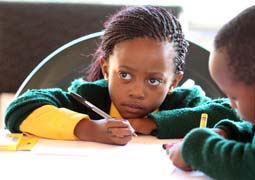
Underperformance of farm schools and in impoverished rural areas came sharply into focus during the National Council of Provinces (NCOP) debate of the Department of Basic Education Policy Budget Vote this week.
NCOP delegate from the Free State Mr Makosini Chabangu said the situation gave an impression that South Africa had “two education systems in one, one white, well-resourced and prosperous, and the other one black, under-resourced and forever in crisis.
“Schools in rural areas, farms and townships, which cater primarily for black and poor learners, are littered with problems of underperformance and problems of poorly trained teachers,” Mr Chabangu said.
To prove this point, he added, in quintile one schools, which is the poorest 20 per cent, the matric pass rate has dropped from 70.3 percent to 61.6 in the past three years, while the matric pass rate in the wealthiest schools has remained consistently at between 91 and 92 per cent.
He also accused the department of doing little to stem the tide of student dropouts from these underperforming schools. “It is for this reason that only half of those who enter grade 1 will write their grade 12 exams.
“This is what needs to happen to solve basic education problems in this country: the department must lead a process to restore the dignity of teaching. This must entail reviewing the salaries of teachers, to ensure that they are properly paid. It will also entail freeing the teaching profession from the tentacles of the South African Democratic Teachers’ Union (SADTU),” said Mr Chabangu.
Addressing the problems thoroughly, he said, will also “ensure that we tackle the problems of basic education in a comprehensive manner and are not fixated on matric pass rates, but with the quality of the education system in its entirety.”
The alleged undue influence of SADTU was echoed by North West delegate of the NCOP, Mr Christian Hattingh who accused the union of “blocking measures that were in the interest of the learners”.
“SADTU believes that only the interests of its members are paramount, and will happily block measures that are in the interest of learners. South Africa has the highest proportion of teaching days lost to strike action according to a cross-sectional dataset from the Southern and Eastern Africa Consortium for Monitoring,” said Mr Hattingh.
KwaZulu-Natal NCOP delegate Mr Mntomuhle Khawula said education in South Africa has continued to be plagued by the economic divide of financial viability. “This divide perpetuates the trend of quality education to those who can afford quality and poor education for those who cannot afford to pay for quality.
“Poor planning, poor alignment of programmes and poor co-ordination of resources has once again compromised the department’s objective of improved quality and this results in the department failing to reach it targets,” said Mr Khawula.
Western Cape delegate Ms Tandi Mpambo-Sibhukwana said the state of basic education is failing poor children, especially in rural and farm areas.
“It is no secret that poor children in rural areas suffer the most from substandard basic education. It was found through studies that most teachers teaching in these remote areas do not even have qualifications to teach. We recommend the issuing of competency test to all new and old teachers in school areas where the problem exists,” she said.
The Minister of Basic Education, Ms Angie Motshekga, presented her department’s budget vote for debate in the NCOP and announced an allocation of over R700 billion for all the provincial education departments.
“The total allocation for the 2017 Medium Term Expenditure Framework (MTEF), period for provincial education departments totals R717 billion, which represents an average increase of 7.1% from the equivalent allocation for the 2016 MTEF period,” the Minister announced.
The Minister will be closely monitoring whether provincial education departments are achieving the predetermined norm of the 80 to 20 split between compensation of employees allocations versus the other budget line items.
She also told the NCOP that the provincial treasuries in the Eastern Cape and Limpopo had taken over the financial responsibilities from those provinces’ Departments of Education, in terms of section 18 of the Public Finance Management Act.
“We understand that on 31 May 2017, the Select Committee on Finance received a satisfactory report on the progress made in the Limpopo Department of Education, to an extent that the Limpopo Provincial Treasury may withdraw in July 2017,” Ms Motshekga said.
“We are closely monitoring the progress in the Eastern Cape. What comforts us is the fact that the Head of Department has recently been appointed. We have deployed three senior officials to assist the Head of Department with critical management practices and leadership areas which require such support.
The Minister said the National Development Plan (NDP) “enjoins us to increase the number of learners entering vocational and occupational pathways”.
The incremental implementation of the three-stream curriculum model, which includes the academic, technical-vocational, and the technical-occupational streams, responds to this NDP injunction. Basic education is now a progressive system with a diversified curriculum, a system that looks at the whole development of a child – our future leaders
Sakhile Mokoena
8 June 2017

